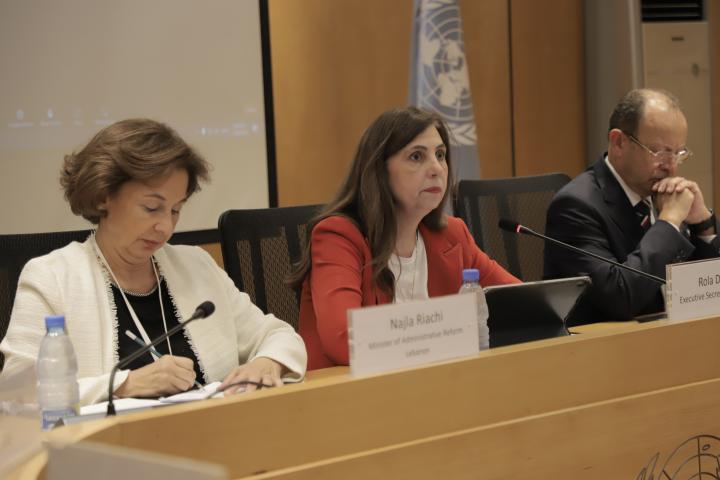Beirut, 21 June 2018 (Communication and Information Unit)--The implications of frontier technologies for employment and youth empowerment in the Arab region are being highlighted at the Economic and Social Commission for Western Asia (ESCWA) during a two-day expert meeting in Beirut, Lebanon that opened on Thursday.
The outcome of discussions will feed into the 30th Ministerial Session of ESCWA taking place next week which is focusing on “technology for sustainable development in the Arab region.”
“Investing in technology is to invest in the human being,” said ESCWA Executive Secretary Mohamed Ali Alhakim at the opening of the event, which brought together dozens of participants from government institutions, civil society, the private sector and academia.
“What measures do we need to implement to ensure that when countries develop technology, they are also advancing sustainable development efforts?” he asked. “Together, we need to ensure that it is not just technology for the sake of technology, but that it contributes to building more resilient and prosperous nations where no one is left behind.”
Today’s frontier technologies, which include innovation in areas such as artificial intelligence, data science, and nanotechnology, cause lasting change to our lives, particularly in terms of economic and social development. While convinced of its numerous benefits, the Arab region shares global concerns regarding technology’s harmful effects, notably on unemployment and inequality.
“Adequate policies and regulation can ensure that frontier technologies are optimally aligned with desired development outcomes, chiefly the 2030 Agenda and its Sustainable Development Goals,” stressed Mr. Alhakim, noting that 2030 is around the corner and that the UN system and its partners have a responsibility to support governments in determining the most effective way forward.
According to recent studies, 70 per cent of internet users in the Arab region are concerned with artificial intelligence’s potential for privacy infringement, while 46 per cent worry that it could cause loss of jobs, with robots and other technologies replacing human jobs on a large scale.
“The fourth industrial revolution is having positive and negative effects on jobs, similar to the three previous revolutions,” said Cristiano Pasini, the representative of the UN Industrial Development Organization (UNIDO) in Lebanon, Jordan and Syria, in reference to the steam, electricity and electronic revolutions which each had significant impact on employment since the 1700s.
To address present risks, experts in education, labor, industry, trade, and more, are exploring means of accelerating the benefits of frontier technologies and innovation in local and regional development while limiting their negative impact, notably on security and youth employment.
The meeting comes at a fitting time just days before the 30th Ministerial Session of ESCWA scheduled from 25 to 28 June. Held every two years, the session is the main governing body of the regional commission, where ministers and high-level member State officials convene to discuss the work programme and key economic and social development issues facing the region.
Their discussions on this year’s theme will be informed by the outcome of the expert group meeting on frontier technologies, which is expected to:
- Identify the most relevant and highest impact frontier technologies for the region over the coming decade, highlighting the promised benefits to sustainable development as well as potential harm of these technologies;
- Define the leadership roles expected of key stakeholders (governments, private sector, civil society) to transform sustainable development challenges into lucrative and safe economic and social opportunities;
- Identify priority areas in reforming curricula, delivery methods and approaches to learning at all levels to benefit from exponential developments in technologies and related economies;
- Develop a roadmap towards the realistic, locally-sensitive quantification of the impact of frontier technologies on employment, particularly among the youth;
- Draw lessons learned and best practices from successful localized applications of frontier technologies to economic and social challenges in the region;
- Promote general guidelines and regulatory templates, emphasizing the importance and benefits of regional coordination and policy coherence, to accelerate the productivity benefits of frontier technologies while mitigating their undesired effects.
For more information:
Nabil Abu-Dargham, Head, ESCWA Communication and Information Unit
+961-70-993-144; email: dargham@un.org
Ms Rania Harb +961-70-008-879; email: harb1@un.org
Ms Myrna Mahfouz: +961-70-872-372; email: mahfouz@un.org
Mr Haidar Fahs: +961-70-079-021; email: haydar.fahs@un.org



